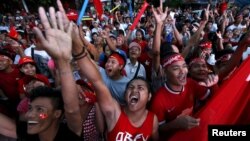Myanmar opposition leader Aung San Suu Kyi - whose National League for Democracy party swept to a resounding victory in November 8 parliamentary elections - has opened talks with long-standing military foes as she prepares to form the next government.
She met Sunday in the capital, Naypidaw, with current parliament speaker Shwe Mann, an ex-general once considered the third most powerful figure in the country's former military government. Ousted last year as head of the ruling USDP party, Shwe Mann described the meeting Sunday as cordial and said Aung San Suu Kyi congratulated him on "accepting the [election] results swiftly."
So far, the NLD has won more than 80 percent of the seats in the bicameral parliament, a margin that will allow it to choose the country's next president.
The daughter of assassinated independence hero Aung San, Aung San Suu Kyi is herself barred from becoming president by the country's junta-era constitution. But she wields enormous power as NLD leader, as she prepares for meetings later this week with President Thien Sein and military leader General Min Aung Hlaing.
President vows smooth transition
President Thien Sein, speaking Sunday, vowed his full cooperation in the transition to a new government, in an attempt to ease domestic and international concerns that the military will once again ignore election results, as it did a quarter century ago.
The National League for Democracy won a similar landslide election victory in 1990. But the country's military leadership refused to honor the results and instead charted a course of authoritarian rule that included the imprisonment of many pro-democracy advocates. After years of increasingly harsh international sanctions, the junta dissolved itself in 2010.
From prisoner to pinnacle of power
Aung San Suu Kyi, who spent 15 years under house arrest for her pro-democracy activism, has in recent days raised eyebrows among the country's military leadership, insisting that she will appoint a proxy president with little power, while governing from a position above the presidency.
But as the NLD margin of victory widened late last week, the Nobel laureate softened her rhetoric, declining to make a victory speech and urging supporters to avoid displays of triumphalism.
NLD spokesman Nyan Win told reporters Sunday that his party will continue to seek national reconciliation, as full democracy takes hold in the Southeast Asian nation for the first time in more than five decades.
Aung San Suu Kyi, who was elected to parliament in 2012, returns Monday to the legislature, where she will attend a last session of the old lawmaking body. That parliament will continue sitting as a caretaker legislature until January.





